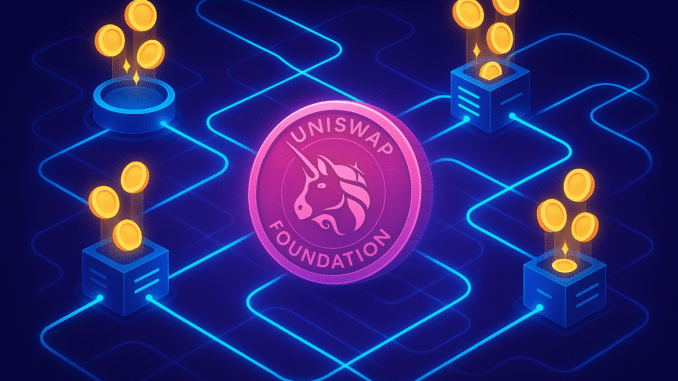
Brevis will develop a trustless rebate system for routers that integrate v4 hooked pools.
The initiative will verify rebates automatically without centralized supervision.
The program aims to supercharge Uniswap v4 adoption by rewarding aggregators.
The Uniswap Foundation has awarded blockchain infrastructure company Brevis a significant grant in efforts to fuel the adoption of its recent upgrade, Uniswap 4.
According to today’s official blog, the foundation plans to allocate up to $9 million to launch and manage an innovative Hooks Routing Rebate program.
The new initiative offers gas rebates to routers that have integrated v4’s hooked pool.
Notably, the grant aims to hasten Uniswap’s version 4 adoption.
The announcement indicated:
To accelerate v4 hook adoption and make aggregator integration more rewarding, Uniswap has awarded a grant to Brevis to leverage its ZK Data Coprocessor and zkVM to deliver trustless gas rebates to any routers that route order flow through v4 hooked pools.
🚀 @UniswapFND has awarded Brevis a grant to build a trustless gas rebate program for v4 routers!
Up to $9M in rebates for DEX aggregators integrating v4 hooked pools. All calculations verified by Brevis ZK proofs.
Here’s what we’re building 🧵 pic.twitter.com/7o4uLVPGCT
— Brevis (@brevis_zk) October 24, 2025
The decentralized trading protocol released its V4 update early this year, introducing advanced features like hooks – which are modules that developers can use to personalize liquidity pools.
Moreover, V4 launched a singleton infrastructure that merges pools under a single contract.
These upgrades introduced friendly fees, on-chain automation, and enhanced experience for decentralized application (dApp) developers.
Furthermore, v4 promised traders reduced slippage, lowered fees, and more efficient trade execution.
The January 31 blog read:
Beyond customizability, Uniswap v4 provides gas savings for both swappers and LPs. Creating new pools with v4 is up to 99.99% cheaper than in previous versions, and swappers can expect gas savings on multi-hop swaps.
Rewarding aggregators after resource-intensive tasks
Besides introducing new advancements, the upgrade brought new challenges for decentralized aggregators like Velora, 1inch, and 0X.
Decentralized aggregators are platforms that find the top trade routes by combining liquidity across different DEXs.
Previous versions had easier integrations.
For instance, Uniswap v2 adopted a constant-product approach, whereas version 3 amplified complexity through concentrated liquidity and fee tiers.
Nonetheless, v3 still ensures a consistent model.
Meanwhile, the much-awaited Uniswap version 4 allowed each pool to function independently based on the hooks it utilizes.
With that, hooks could introduce new execution ideas, apply special trading conditions, and adjust fees.
That offers the flexibility that boosts integration.
However, it made everything demanding and complex, as aggregators should familiarize themselves with how every personalized pool functions before using it to route trades.
That’s where the new rebate program by the Uniswap Foundation comes in.
The initiative allows the interoperable protocol to incentivize routers that integrate hooked pools successfully, offering up to $9 million in gas rebates.
Users will receive the rewards automatically according to their routing activity.
Meanwhile, these rebates can lower trading fees, fund ecosystem developments, and offset gas expenses.
The team said:
These rebates provide routers new economic relief to experiment with v4 hooks. Whether routers use them to offset their own operating costs, pass rebates back to traders as lower fees, or build sustainable treasuries, the result is the same: faster integrations, deeper liquidity, and better swap execution with reduced fees for users.
Uniswap’s native token, UNI, trades at $6.24 after an over 1% increase in the past 24 hours.





Be the first to comment